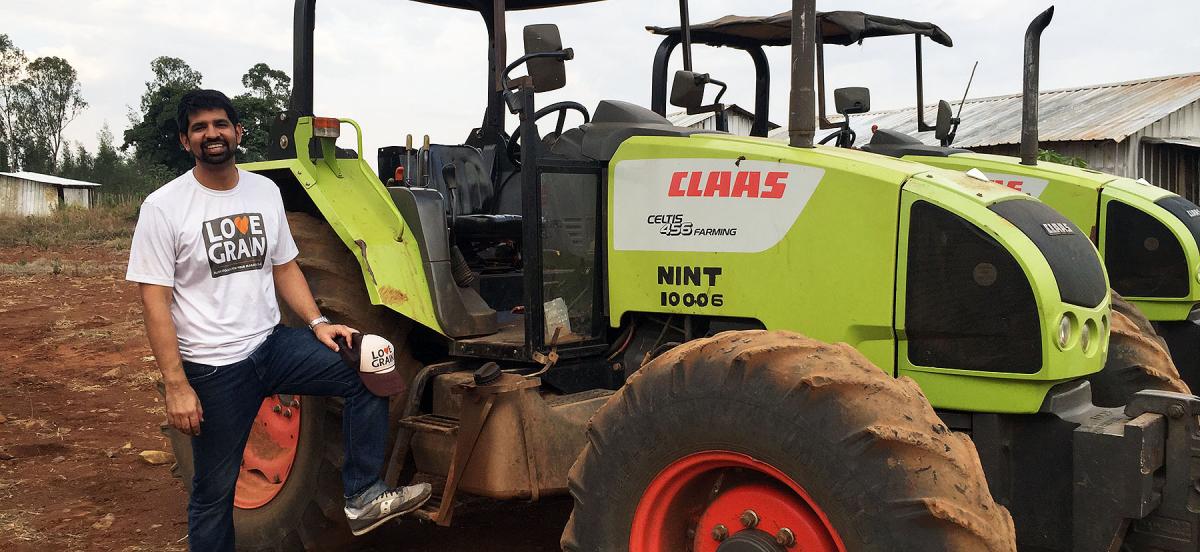Teff Love: An Entrepreneur's Idea Aids Ethiopian Farmers

Aleem Ahmed '07 in Bako, Ethiopia, visiting a farm that grows teff.
Details
Aleem Ahmed ’07 is promoting the nutritionally packed ancient grain to help grow profits and improve the livelihoods of small farmers in Ethiopia.
Before it became a healthfood superstar, few Americans had heard of quinoa, much less eaten it. Aleem Ahmed ’07 is looking to spread the word about a similar grain called teff that boasts even more benefits. Grown in Ethiopia and packing a big nutritional punch, the world’s tiniest grain is gluten-free, with high levels of calcium, fiber, protein, and vitamins. With his new company, Love Grain, the social entrepreneur’s goal is to sell products made with teff bought directly from the Ethiopian farmers who grow it.
“Typically, teff trades hands five or six times,” says Ahmed, explaining how brokers and others divert profits from farmers. “If we purchase it directly, it would increase [farmers’] income around 25 percent.” More than 6.5 million small farms grow teff in Ethiopia. Love Grain, he says “is a very mission-driven business.”
Ahmed discovered teff, a 5,000-year-old grain best known as the prime ingredient of the spongy Ethiopian flatbread injera, several years ago while working for the Ethiopian Agricultural Transformation Agency. Ahmed’s team was helping teff farmers double their production through improved planting techniques.
“In the morning I’d eat injera, and I didn’t get hungry as quickly as when I ate cereal, or eggs and toast,” he says. “It sustained me for the whole day.” That’s because teff is a high-fiber grain that’s low on the glycemic index, which measures how quickly a food raises blood glucose.
Excited about the potential of teff to improve quality of life for the farmers who grow it, Ahmed returned home to learn how to launch a financially sustainable business that would contribute to growth in East Africa. After graduating in 2015 with a joint MBA from the MIT Sloan School of Management and an MPA from the Harvard Kennedy School of Government, he moved to San Francisco, where he’s working full-time on developing Love Grain (the name is a play on teff’s scientific name, Eragrostis tef, the grass of love).
Ahmed, who grew up outside Washington, D.C., learned about social change and international development early on. His mother, whose family is from Tanzania, was a Head Start teacher, and Ahmed grew up visiting her classroom. His dad worked for the World Bank and shared stories with Ahmed about business start-ups in developing countries. “Those two approaches to social change were always around me,” he says. “[They were] the topics of conversation at the dinner table.”
After graduating from Haverford, Ahmed, a political science major, worked as a management consultant in Boston, then began his development career with the nonprofit group Innovations for Poverty Action in Kenya, a drinking-water safety team helping rural communities access chlorine to treat their water. “I loved the work I did there,” Ahmed says. “I really found my passion working in sub-Saharan Africa. It built on some of the values I developed growing up with my family and the values of social justice I learned at Haverford.” Intrigued by the power of agriculture and farming to change lives, he moved to Ethiopia and worked for the government’s agricultural agency—and discovered teff.
In 2013, while he was attending graduate school, Love Grain was born. With $10,000 that he won in MIT’s Global Challenge competition, Ahmed launched his first product, a teff-based pancake and waffle mix.
He is currently developing his next product: teff snack chips, in three flavors. “The pancake mix showed us that our target demographic would be interested in trying something new,” he explains. In 2015, he was awarded an Echoing Green Fellowship, which is helping him grow the business with financial support and the support of other social entrepreneurs. (Ahmed was the second Haverford alum to be recognized by Echoing Green, which named Katrina Mogielnicki-Spade ’99 a fellow in 2014.)
Love Grain also plans to help Ethiopian farmers improve productivity with better training and equipment. “With the combination of greater crop yields and being paid a higher price for their grain, there could be a really profound impact on livelihoods,” Ahmed says. “Teff farmers could purchase food they can’t grow, medicines for children, and uniforms for their kids to go to school.”



